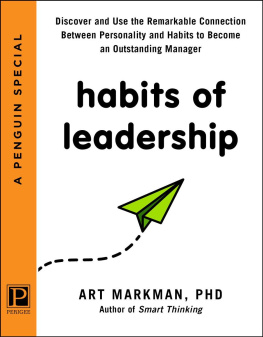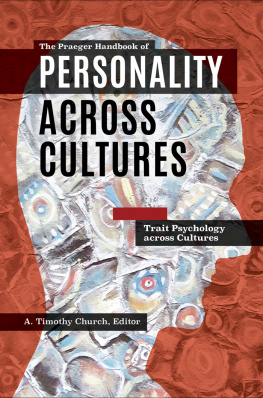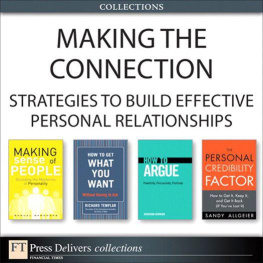Also by Samuel Barondes
Cellular Dynamics of the Neuron
Neuronal Recognition
Molecules and Mental Illness
Mood Genes
Better Than Prozac
Making Sense of People
Decoding the Mysteries of Personality
Samuel Barondes
Vice President, Publisher: Tim Moore
Associate Publisher and Director of Marketing: Amy Neidlinger
Acquisitions Editor: Kirk Jensen
Editorial Assistant: Pamela Boland
Operations Manager: Gina Kanouse
Senior Marketing Manager: Julie Phifer
Publicity Manager: Laura Czaja
Assistant Marketing Manager: Megan Colvin
Cover Designer: Sandra Schroeder
Managing Editor: Kristy Hart
Senior Project Editor: Lori Lyons
Copy Editor: Krista Hansing Editorial Services, Inc.
Proofreader: Language Logistics, LLC
Senior Indexer: Cheryl Lenser
Senior Compositor: Gloria Schurick
Manufacturing Buyer: Dan Uhrig
2012 by Samuel Barondes
Pearson Education, Inc.
Publishing as FT Press
Upper Saddle River, New Jersey 07458
FT Press offers excellent discounts on this book when ordered in quantity for bulk purchases or special sales. For more information, please contact U.S. Corporate and Government Sales, 1-800-382-3419, .
Company and product names mentioned herein are the trademarks or registered trademarks of their respective owners.
All rights reserved. No part of this book may be reproduced, in any form or by any means, without permission in writing from the publisher.
Printed in the United States of America
First Printing July 2011
ISBN-10: 0-13-217260-7
ISBN-13: 978-0-13-217260-8
Pearson Education LTD.
Pearson Education Australia PTY, Limited.
Pearson Education Singapore, Pte. Ltd.
Pearson Education Asia, Ltd.
Pearson Education Canada, Ltd.
Pearson Educacin de Mexico, S.A. de C.V.
Pearson EducationJapan
Pearson Education Malaysia, Pte. Ltd.
Library of Congress Cataloging-in-Publication Data
Barondes, Samuel H., 1933
Making sense of people : decoding the mysteries of personality / Samuel Barondes. -- 1st ed.
p. cm.
Includes bibliographical references (p. ) and index.
ISBN 978-0-13-217260-8 (hardback : alk. paper)
1. Personality. I. Title.
BF698.B31837 2012
155.22--dc22
2011001026
For Louann
And for my grandchildren:
Jonah Lazar
Ellen Ariel
Asher Lucca
Every man is in certain respects
(a) like all other men,
(b) like some other men,
(c) like no other man.
Clyde Kluckhohn and Henry A. Murray
Introduction. When Intuition Isnt Enough
All of us are personality experts. Ever since childhood, weve been paying attention to peoples distinctive ways of being in hopes of figuring out what to expect from them. We depend on this information to get along.
The innate ability to size people up is an amazing gift that we take for granted. With it, we form an instantaneous impression of the personality of everyone we meet. This rapid intuitive process works so well that we learn to rely on it. Most of our assessments of people are formed in this automatic and unconscious way.
But there are times when we want to consciously evaluate someones personality. We may, for example, want to understand what it is about our boss that makes us avoid her. We may want to sort through the reasons we dont approve of our teenage daughters boyfriend. We may want to decide if the person were dating has the right stuff for a permanent relationship.
Thats when the going gets tough. The difficulty mainly arises because few of us have been taught a systematic way to assess personalities. Instead, we are constantly bombarded with a contradictory mishmash of religious, moral, literary, and psychological ideas that are hard to apply in an orderly manner. Imagine how we would struggle to do simple arithmetic if we kept getting contradictory instructions on how to work with numbers. Yet were expected to make sense of people without having been taught a coherent arithmetic of personality.
This lack of education may be responsible for some of our biggest mistakes. It can lead us to pick the wrong suitor, take the wrong job, or misguide our children. It can cause us to misinterpret a coworkers intentions and become inappropriately defensive, or compliant, or aggressive. It can keep us from building satisfying relationships, gracefully avoiding conflicts, or developing plans to protect our interests by fighting back.
In this book, I describe a system for thinking about personalities that may help you avoid such mistakes. Based on decades of research, each chapter will make it easier for you to organize the data you already have about particular people and to start noticing characteristics that you may have overlooked. Sorting through this information will give you a clearer sense of each person and how to relate to them.
To get started, I will show you how to combine two vocabularies that professionals use to organize their observations. One breaks down personality into five well-defined general characteristics, such as conscientiousness and agreeableness, each of which has several components. This makes it easier to think things through using a well-defined set of words.
The other vocabulary shifts attention from these general traits to ten potentially troublesome patterns of behavior, such as compulsiveness or paranoia. Mild versions of these patterns may simply be notable parts of a well-functioning personality. But some of us have inflexible and maladaptive versions of one or a few of them, versions that frequently bring grief to those we deal withand to ourselves. More than the rest of us, such people are prisoners of personality who are locked into ways of being they seem unable to escape.
Combining these two easy-to-learn vocabularies will not only help you make clearer assessments of everyone you meet. It will also raise questions about the reasons people get to be so different from each other. In the second part of the book, I will describe the development of the brain circuits that control our distinctive combinations of traits and patterns. I will also show that the decades-long developmental process that builds these brain circuits is strongly influenced by the two great accidents of our birth: the specific set of genes we happen to be born with and the specific world we happen to live in.
But theres more to a personality than traits and patterns. In the third part of the book, I will turn to the values and goals that give meaning and purpose to peoples lives. To flesh out this view, I will show you how to apply universal and culture-specific standards of morality to assess a persons character. I will also encourage you to pay attention to the stories people tell about themselves, which will help you figure out what they stand for and their sense of identity.
Systematically organizing all this information about traits, patterns, character, and identity will help you make sense of anyone. It may also influence the approach you choose to engage with them. In some cases, this may encourage you to shrug off their disquieting idiosyncrasies in favor of forgiveness and compassion. In other cases, it may alert you to telltale signs of danger so that you can take protective actions. In still other cases, it may open your heart to warm feelings of love and respect. In all cases, it will enhance your appreciation of human diversity in the same way that those who know a lot about wine, or music, or baseball get the added pleasure that comes from thoughtful attention to the details. Augmenting your pleasure in understanding and dealing with people, whether you like them or not, is the main aim of this book.
Next page







